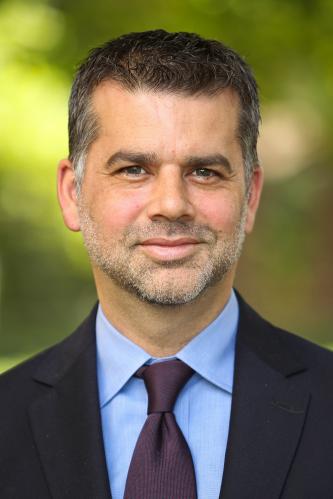We’re going to slow-walk all [of AUKUS] because it’s all really complicated, and then we’re going to find ourselves in a […] shooting war with the Chinese and we’re going to realize we..."
Brookings Affiliation
Research Areas
Additional Expertise
- U.S. international security policy
- The U.N. system
Bruce Jones is a senior fellow with the Strobe Talbott Center for Security, Strategy, and Technology in the Foreign Policy program at the Brookings Institution; he also works with the Center for Asia Policy Studies. He is also a consulting professor at the Freeman Spogli Institute at Stanford University. From 2015 to 2020, Jones previously served as the vice president and director for the Foreign Policy program.
Jones’ research expertise and policy experience is in international security. His current research focus is on U.S. strategy, international order, and great power relations. His most recent books on the topic are “To Rule the Waves: How Control of the World’s Oceans Shapes the Fate of the Superpowers” (Scribner, 2021); “The Marshall Plan and the Shaping of American Strategy,” (Brookings Institution Press, 2017); and “Still Ours to Lead: America, Rising Powers, and the Tension between Rivalry and Restraint” (Brookings Institution Press, 2014). He is also co-author with Carlos Pascual and Stephen Stedman of “Power and Responsibility: Building International Order in an Era of Transnational Threats” (Brookings Institution Press, 2009); and co-editor with Waheguru Pal Singh Sidhu and Pratap Bhanu Mehta of “Shaping the Emerging World: India and the Multilateral Order” (Brookings Press, 2013). Other publications include “The State of the International Order,” with Thomas Wright (Brookings, 2014); “Managing a Changing World” (Foreign Policy, March 2011); and “How Do Rising Powers Rise?” (Survival, December 2010).
Jones has conducted research focused on the geopolitics of energy and climate change. He recently co-authored with David Victor a report titled, “Undiplomatic action: A practical guide to the new politics and geopolitics of climate change” (Brookings, February 2018). Other publications include: with David Steven, “The Risk Pivot: Great Powers, International Security and the Energy Revolution” (Brookings Institution Press, November 2014); with David Steven and Emily O’Brien, “Fueling the New Order” (Brookings, April 2014); and with David Steven and Andrew Hart, “Chill Out: Why Cooperation is Balancing Conflict Among Major Powers in the New Arctic” (Brookings, 2012).
Jones has extensive experience and expertise on intervention and crisis management. He served in the United Nations’ operation in Kosovo, and was special assistant to the U.N. special coordinator for the Middle East peace process. He is co-editor with Shepard Forman and Richard Gowan of “Cooperating for Peace and Security” (Cambridge University Press, 2009) and author of “Peacemaking in Rwanda: The Dynamics of Failures” (Lynne Reinner, 2001). He has also served in advisory positions for the U.S. State Department and the World Bank on fragile states, including as senior external advisor to the World Bank’s “2011 World Development Report on Conflict, Security and Development.”
Jones also has significant experience on multilateral institutions. He was a senior advisor to Kofi Annan on U.N. reform and served as deputy research director to the U.N.’s High-level Panel on Threats, Challenges and Change, as well as lead scholar for the International Task Force on Global Public Goods. Related publications include “Managing the New Threat Landscape: Adapting the tools of International Peace and Security” (Brookings, September 2018); “Beyond Blocs: The West, Rising Powers and Interest-Based International Cooperation” (The Stanley Foundation, October 2011); “Libya and the Responsibilities of Power” (Survival, June 2011); and “The G8 and the Threat of Bloc Politics in the International System” (Brookings, May 2011).
Jones has written for, appeared with, or been cited by: CNN; BBC World Service; The New York Times; Los Angeles Times; NPR; The Huffington Post; Nikkei Asian Review; Project Syndicate; “The Tavis Smiley Show”; Al Jazeera English; Reuters; Voice of America; CCTV; and Sky News.
He holds a doctorate from the London School of Economics, and he was the Hamburg fellow in conflict prevention at Stanford University.
Affiliations:
- New York University, nonresident fellow
- Stanford University, consulting professor
- Yale Law School, Paul Tsai China Center, nonresident affiliated fellow
-
Current Positions
- Professor, by courtesy, New York University Department of Politics
- Consulting Professor Stanford University, Center for International Security and Cooperation
-
Past Positions
- Senior External Advisor for the World Bank’s 2011 World Development Report
- Member of the Senior Advisory Group for the United Nations Review of International Civilian Capacities
- Senior Advisor, Office of the U.N. Secretary-General
-
Education
- Ph.D. (2000), M.A. (1992), London School of Economics
- B.A., University of Toronto, 1990
Media and Appearances
Why are the Americans getting so outplayed? China exerts its influence not by funding the secretariat but because it is a major development partner with a majority of countries in Asia..."
Ironically, the precise strength of the U.S. energy sector—that it is driven by the market and not by a government—also means that it is not a stick to beat people with.
Obama hasn’t made it clear he’s willing to escalate if Putin does; that lack of certainty Putin can exploit. If he’s not certain we will escalate, for him the risk of escalating is..."
The old days when the U.S. and the Europeans could stitch things up at the United Nations are over.
[President Obama] is demonstrating that core American security objectives can be pursued through the UN.
